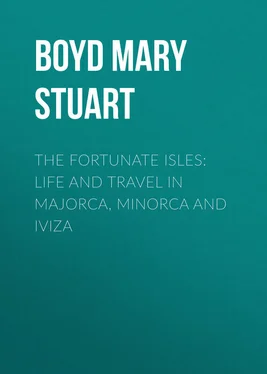Mary Boyd - The Fortunate Isles - Life and Travel in Majorca, Minorca and Iviza
Здесь есть возможность читать онлайн «Mary Boyd - The Fortunate Isles - Life and Travel in Majorca, Minorca and Iviza» — ознакомительный отрывок электронной книги совершенно бесплатно, а после прочтения отрывка купить полную версию. В некоторых случаях можно слушать аудио, скачать через торрент в формате fb2 и присутствует краткое содержание. ISBN: , Жанр: foreign_language, foreign_antique, foreign_prose, Путешествия и география, на английском языке. Описание произведения, (предисловие) а так же отзывы посетителей доступны на портале библиотеки ЛибКат.
- Название:The Fortunate Isles: Life and Travel in Majorca, Minorca and Iviza
- Автор:
- Жанр:
- Год:неизвестен
- ISBN:http://www.gutenberg.org/ebooks/39199
- Рейтинг книги:5 / 5. Голосов: 1
-
Избранное:Добавить в избранное
- Отзывы:
-
Ваша оценка:
- 100
- 1
- 2
- 3
- 4
- 5
The Fortunate Isles: Life and Travel in Majorca, Minorca and Iviza: краткое содержание, описание и аннотация
Предлагаем к чтению аннотацию, описание, краткое содержание или предисловие (зависит от того, что написал сам автор книги «The Fortunate Isles: Life and Travel in Majorca, Minorca and Iviza»). Если вы не нашли необходимую информацию о книге — напишите в комментариях, мы постараемся отыскать её.
The Fortunate Isles: Life and Travel in Majorca, Minorca and Iviza — читать онлайн ознакомительный отрывок
Ниже представлен текст книги, разбитый по страницам. Система сохранения места последней прочитанной страницы, позволяет с удобством читать онлайн бесплатно книгу «The Fortunate Isles: Life and Travel in Majorca, Minorca and Iviza», без необходимости каждый раз заново искать на чём Вы остановились. Поставьте закладку, и сможете в любой момент перейти на страницу, на которой закончили чтение.
Интервал:
Закладка:
Shouting lustily for "Fernando," Bartolomé jumped down and, running to the door, knocked loudly. Receiving no reply, he did not stand upon ceremony but, pushing open the door, went in, beckoning us to follow.
Entering, we found ourselves in a large outer hall with a cobbled floor and a long well-scrubbed table and benches. Following our charioteer, who had opened an inner door, we went into a large dimly-lit room which, when the window-shutters had been opened, revealed itself as a long narrow dining-room of severely ascetic appearance. Tables extended down its length, chairs with seats of interwoven string stood round the walls.
"Look, señora!"
Running to a cupboard, Bartolomé had thrown open the door, disclosing shelves laden with china and crystal.
Again – "Look! señora."
Hastening to the opposite side of the room, he had opened the doors of a big armário , and was pointing to piles of clean table-linen.
It was as though we had strayed into some enchanted castle where all had been prepared for our coming by invisible hands. Going off to explore further, we found our way into a snug kitchen. The whole of one side was occupied by a brown-tiled charcoal stove, on which many dinners could have been cooked simultaneously. The shelves were laden with cooking-pots and pans, of every description; the walls shone with an array of well-polished utensils. Over charcoal embers a huge earthenware pot, that for its better preservation had been encased in a strait-waistcoat of wire-netting, was slowly bubbling.
Essaying to mount the stair leading from the hall, we peeped into closely shuttered apartments in which we could see the dim outlines of beds. And what we saw assured us of one thing – that there were no other guests at the Hospederia.
From the perfect order of the house, and the fact that the fire was burning, it was clear that someone must be close at hand. But we had come a long way, and in the meantime we were famishing.
Hastening to our aid, the ubiquitous Bartolomé spread the table, putting out plates and glasses, and finding wooden spoons and forks in the drawer of a side-table. Opening our packets of sandwiches and fruit, we invited him to join us.
We were all seated at table, busily eating, when a swift clatter of feet sounded on the cobble stones of the outer hall; and a brisk little brown woman ran into the room, voluble with apology for the temporary absence of the keepers of the Hospederia. Netta, she explained, was away. Fernando was working at the farm. In their absence could she be of any service to our excellencies?
Reassured on that point, the lady – Catalina was her name – remained to enliven our picnic lunch by rallying Bartolomé, who was an old acquaintance of hers, on his unparalleled effrontery in sitting down to table with us.
"You have no right to eat with their excellencies," she said. "You are only a coachman."
"But if he is a good coachman?" asked the Man.
"Ah, no, señor. He is not a good coachman. He is a bad coachman. And, besides, he cannot spread a table. See! he has given you no table-cloth, no napkins, when he knows the cupboard is full of them. No, he is a very bad coachman indeed!"
When our scrap meal was finished, Catalina proceeded to show us our sleeping accommodation. Unlocking a door that we had not tried, she led us through a pleasant room with two beds, to one with two windows – one facing the highroad, where Bartolomé's carriage still waited, the other affording a beautiful view of the rugged coast.
Catalina explained that these rooms were usually allotted to foreigners such as ourselves, the less attractively situated being reserved for natives of the island, who were at liberty to share the Archduke's hospitality, although the Hospederia was originally intended for the use of other travellers. A handsome new dining-room in process of construction, though during our stay no one was actually working at it, was also planned for the accommodation of those from far countries, but to us the appointments of the older building seemed peculiarly in keeping with the quaint idea of the Hospederia.
The bedrooms were simply but sufficiently furnished. Each had two single beds, half-a-dozen chairs, a plain wooden table, and a tripod washstand holding the smallest basin and ewer we had seen outside France. The roofs were raftered. All was the perfection of austere cleanliness.
Before our inspection was ended Fernando, the host, a good-looking man with the gracious deportment of an operatic tenor, had returned. His grandmother had been the original housekeeper of the Hospederia. On her death, at the age of ninety-nine, her office had descended upon Fernando and his young wife Netta.
We spent the all too short November afternoon and evening in exploring the slopes about Miramar, looking at the glorious views that perpetually presented some yet more glorious aspect. The Hospederia was over a thousand feet above the sea, to which the ground fell precipitously. Above the house the land rose up and up until it ended in towering crags. Northward stretched the Mediterranean. Elsewhere the eye met nothing but range upon range of mountains.
The extensive grounds of Miramar are well shaded with olive and carob trees, but at every point that affords a specially good view of some part of the exquisite scenery the Archduke has caused to be erected a mirador , or walled enclosure, where one can sit in safety and glory in the beauty of the surroundings.
From one of these we watched the after-glow of the setting sun illumine distant peaks, bringing into prominence heights whose existence we had scarcely realized.
The darkness, falling swiftly, surprised us while a good distance from the Hospederia, and we had to find our way back by untried paths. But the fascination of the place held us captive, and when the moon began to peep out from among the clouds we could not remain indoors, as more sensible folks would have done. Wrapping up a little, for it was colder on the northern coast of the island than at Palma, we went out, determined to reach a headland by the sea, on which from above we had caught tantalizing glimpses of a shining white temple.
Except from a mirador the temple was not visible, and we wandered by many devious ways before we again came in sight of it, perched above the sea on a high rock that is reached by a stone bridge thrown over a deep gully.
As we felt our way along, for the elusive moon was again behind a cloud, all was silent, mysterious. Surely Miramar at nightfall in winter is one of the most silent places on the earth. We felt as though there was not a human being alive but ourselves.
Crossing the bridge timorously, we found ourselves confronting the ghostly white chapel. When we had told Catalina of our desire to visit it, she had given us keys, but they did not fit. And as we proceeded to fumble with the lock, the silence was so intense that I could almost have imagined that someone within was holding his breath to listen. Had we knocked upon that closed door I had an eerie conviction that the spectre of some long-dead monk would have opened it.
But we did not knock. And the moon favouring us with a glimpse of her illumining power, we walked round the base of the temple, which is securely railed in, and watched the moon outline with silver finger-tips each point and pinnacle of the hills and shimmer softly on the sea.
When we returned to the Hospederia, Fernando had gone to fetch his wife; and Catalina, who had been left in charge, bustled into the dining-room to tell us that two carabineros had come, and were resting in the kitchen.
"Have they come after us?" cried the Man; and Catalina, who enjoyed even the mildest of humour, wrinkled her brown face in delight.
The dining-room where we sat was large and dimly lit by oil lamps. After the silence of those wooded slopes the prospect of even the company of two carabineros was alluring. So when I went into the kitchen to cook the lamb cutlets and tomatoes that comprised our modest supper, my men followed me.
Читать дальшеИнтервал:
Закладка:
Похожие книги на «The Fortunate Isles: Life and Travel in Majorca, Minorca and Iviza»
Представляем Вашему вниманию похожие книги на «The Fortunate Isles: Life and Travel in Majorca, Minorca and Iviza» списком для выбора. Мы отобрали схожую по названию и смыслу литературу в надежде предоставить читателям больше вариантов отыскать новые, интересные, ещё непрочитанные произведения.
Обсуждение, отзывы о книге «The Fortunate Isles: Life and Travel in Majorca, Minorca and Iviza» и просто собственные мнения читателей. Оставьте ваши комментарии, напишите, что Вы думаете о произведении, его смысле или главных героях. Укажите что конкретно понравилось, а что нет, и почему Вы так считаете.











![John Bruce - The Lettsomian Lectures on Diseases and Disorders of the Heart and Arteries in Middle and Advanced Life [1900-1901]](/books/749387/john-bruce-the-lettsomian-lectures-on-diseases-and-disorders-of-the-heart-and-arteries-in-middle-and-advanced-life-1900-1901-thumb.webp)
